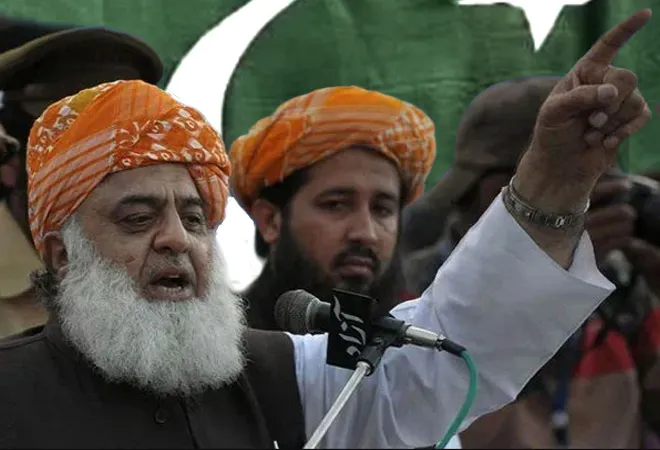 This brief is part of the series, Pakistan: The Unravelling
This brief is part of the series, Pakistan: The Unravelling
As expected, May 15 was a very action packed and newsy day. Maulana Fazlur Rehman’s volunteer force, Ansar-ul-Islam,
marched on the Supreme Court, broke through the barricades, and entered the court premises.
Unlike 1997, when the then Prime Minister Nawaz Sharif’s partymen stormed the Supreme Court and forced the judges to flee with their lives, this time the Maulana’s army showed their street power but refrained from any violence or vandalism. Other constituent parties of the ruling coalition also participated in the protest and there were some very
fiery speeches, all targeted against the Chief Justice of Pakistan (CJP) Umar Ata Bandial and his coterie in the apex court. Later in the evening, Maulana Fazlur Rehman declared an end to the protest, but warned that his men could return if required.
The Chief Justice is reported to have expressed concern over the entry of Ansar-ul-Islam activists in the Supreme Court premises and found the way political power was being used as ‘worrisome’.
There were also some very strident speeches made against the Chief Justice in Parliament which resolved to file a reference against the Chief Justice before the Supreme Judicial Council. The details of how this will be done are still unclear because it is unlikely that it can be done through the President of Pakistan who is a devoted acolyte of Imran Khan. But the intention of Parliament is quite clear—it is not ready to back down from taking on the CJP and other ‘Insafian’ (those biased in Imran Khan’s favour) judges. Both the show of force in front of the Supreme Court as well as the strong speeches in Parliament seemed to have had some salutary impact on the judges. The Chief Justice is reported to have expressed concern over the entry of Ansar-ul-Islam activists in the Supreme Court premises and found the way political power was being used as ‘
worrisome’. Considering the role played by the Supreme Court in tying the hands of the government and stymying its efforts to crack down on Imran Khan’s supporters who were responsible for arson, looting, and rioting, it was rich of the CJP to remark that the government appeared ‘helpless’ in stopping national assets, institutions, and installations from being burned.
Even so, the Supreme Court judges seemed to have refrained from pushing things over the edge by initiating contempt proceedings against the government for failing to make available the resources and facilities needed for holding elections to the Punjab Assembly. Whether this was to prevent the Ansar-ul-Islam from doing a 1997 redux or because the Court was buying time as it realised its limitations in enforcing the implementation of its orders is anyone’s guess. On May 15, the Court only issued notices to all concerned parties and adjourned the matter until May 23. It also urged the government and opposition to resume their dialogue to find a mutually acceptable solution to the political imbroglio, a solution that will also give the Court an exit route out of the corner in which it has painted itself.
The Army made it clear that there will be no more restraint shown towards those who attack military installations and set-ups, and resolved to book the guilty under the Army Act and Official Secrets Act.
Meanwhile, a
special Corps Commanders (CC) conference was held in the Pakistan Army’s General Headquarters in Rawalpindi. The meeting of the top brass took place against the background of rumours swirling about the Army being split down the middle between the pro-Imran officers and men, and those who opposed Imran and backed the current Army Chief. The purpose of the meeting was probably to send a message that the Army was closing ranks behind the chief. Whether this is indeed the case will become clear only in the next few days and weeks. But the statement issued by the CC conference corroborated reports that the Army was planning to throw the book at the “planners, instigators, abettors, and perpetrators” of the attacks on military installations and private and public property. The Army made it clear that there will be no more restraint shown towards those who attack military installations and set-ups, and resolved to book the guilty under the Army Act and Official Secrets Act.
This has raised the hackles of even those elements who oppose Imran Khan because booking civilians under these acts will tantamount to an undeclared Martial Law and violate civil liberties and human rights of ordinary Pakistani citizens. Rumours were already doing the rounds that the military brass was considering court martialling Imran Khan, who in a long Twitter thread had already expressed
apprehensions that he will be re-arrested and prosecuted for sedition. From the Army’s point of view, the decisions taken at the CC conference have sent out a clear and unambiguous warning to elements in the rank and file who are believed to be leaking sensitive information to Imran’s supporters who are carrying out a campaign against the Army leadership from Western shores—the United Kingdom, the United States, and Canada. If indeed the Army goes ahead with prosecuting civilians under the draconian Army Act, will the judiciary step in or will the judges back down? The problem is that even the judges opposed to the CJP and his cabal are unlikely to endorse court martials of civilians.
The perfect storm that has engulfed Pakistan is unlikely to weaken anytime soon.
Sushant Sareen is Senior Fellow at Observer Research Foundation.
The views expressed above belong to the author(s). ORF research and analyses now available on Telegram! Click here to access our curated content — blogs, longforms and interviews.



 This brief is part of the series,
This brief is part of the series,  PREV
PREV


